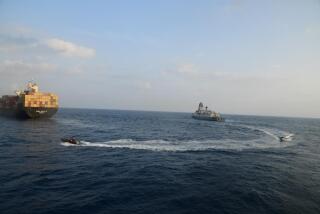Aspin Urges Retaliatory Mining of Gulf
- Share via
WASHINGTON — Rep. Les Aspin (D-Wis.), chairman of the House Armed Services Committee, called Monday on the Reagan Administration to retaliate for Iranian mining of the Persian Gulf by getting Iraq to mine the shipping lanes used by Iranian tankers.
Aspin’s proposal is certain to be highly controversial among other Democrats in Congress, many of whom have been demanding an early end to the buildup of U.S. naval strength in the Persian Gulf.
A frequent critic of President Reagan’s policy in the gulf, Aspin nevertheless said that the United States cannot reverse course at this time. Instead, he said, the Administration should seek to lower its profile in the gulf, pledge to undertake periodic reviews of its re-registering of Kuwaiti tankers under the American flag and consider retaliation for the Iranian mining.
But Aspin ruled out U.S. retaliation against Iran with air strikes on grounds that they would only serve to bolster anti-American sentiment among Iranians and increase the popularity of the regime of the Ayatollah Ruhollah Khomeini.
“It does no good to drop a few bombs on a military installation, with some undoubtedly missing and falling on an apartment house, killing innocent citizens that the Iranian public can grieve over,” he said. “There are other forms of retaliation.”
Asked to respond, Pentagon spokesman Robert B. Sims observed that “we’ve been getting a lot of operational advice from Chairman Aspin on these operational matters” but he declined to comment on his mining proposal. The Administration, Sims noted, is urging a cease-fire in the Iran-Iraq War, including an end to the laying of mines.
“This is an indiscriminate weapon,” Sims said. “It may be an anonymous one . . . but it’s also indiscriminate, and it can affect shipping of all countries.”
Iran’s ‘Invisible Hand’
In his press conference, Aspin noted that Hussein Moussavi, Iran’s prime minister, recently remarked that an “invisible hand” must have planted the mine that damaged the Kuwaiti-owned supertanker Bridgeton on July 24 while the ship was flying the American flag and had a U.S. Navy escort. Defense Secretary Caspar W. Weinberger has since identified it as a mine planted by Iran.
“It is always possible that some other ‘invisible hand’ might drop some mines on the other side of the gulf where vessels chartered by Iran carry virtually all of Iran’s oil exports,” Aspin said. “Someone might tell the Iranian prime minister that people who live in glass houses shouldn’t throw stones.”
He quickly added that he was not advocating that the retaliatory mining be done by the U.S. Navy, but instead by an Iranian opponent in the region such as Iraq.
“There are forces on the other side of Iran that could lay the mines,” he said. “Iraq could do the mining. All I am saying by this statement is, ‘Do not let Iran have a free ride on the mining.’ ”
Aspin took strong exception to the dominant view among Democrats in Congress that the President should be made to seek congressional approval for his policy of having U.S. Navy ships escort Kuwaiti tankers through the gulf. He said that he strongly opposes legislation that would require a congressional vote on the policy after a period of 60 days.
“The only thing that Congress is able to do is the wrong thing to do,” he said. “It tells Iran that the way to get the United States out of the Persian Gulf is to attack American ships, create some bloodshed and try to win the vote in Congress.”
He said that Congress made a similar mistake when Reagan sent Marines to Lebanon in 1983 by requiring a periodic congressional vote to keep them there.
“It’s the same as painting a bull’s-eye on every American in the Persian Gulf region,” he said.
At the same time, Aspin said that the Administration made a mistake when it indicated that the re-registration operation would continue for the duration of the Iran-Iraq War--a period that “could make the Hundred Years War look like a brief skirmish.”
He said Iran is more likely to de-escalate the conflict if the Reagan Administration announces its intention to reduce U.S. military presence in the gulf when such a move appears possible during periodic reviews of the policy.
“Iran wants us out of the gulf,” he said. “It should know that improved behavior on its part will lead to a cutback.”
Aspin also criticized the size of the U.S. armada now in the gulf. He accused the Pentagon of “overreacting” after 37 U.S. crewmen were killed May 17 when the frigate Stark was hit by Iraqi missiles.
“Our profile in the Persian Gulf is too high,” he said. “The high profile . . . is a delight to Tehran. It means that we convey advertising around the world for the Islamic Republic--portraying it in its chosen role of David challenging Goliath--and we do it all for free.”
In addition to lowering the U.S. profile by bringing ships out of the gulf, he said, the Navy should not send the battleship Missouri into the gulf as planned, but instead keep it in the Indian Ocean where it can be called upon if needed.
Aspin said that the Administration also should seek to preclude similar crises in the future by encouraging a crash program of construction of pipelines from the Arab oil states to a point beyond the Strait of Hormuz.
More to Read
Get the L.A. Times Politics newsletter
Deeply reported insights into legislation, politics and policy from Sacramento, Washington and beyond. In your inbox twice per week.
You may occasionally receive promotional content from the Los Angeles Times.










